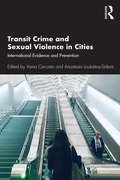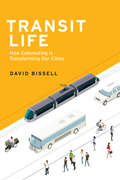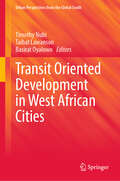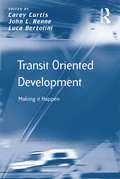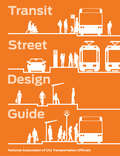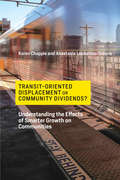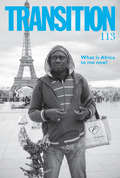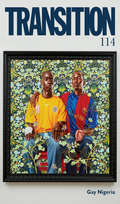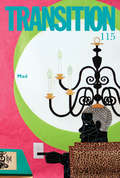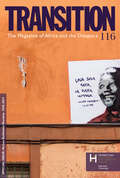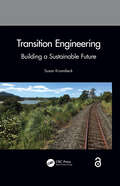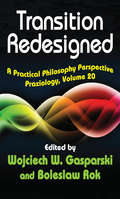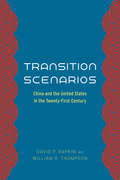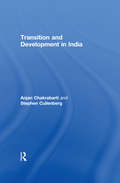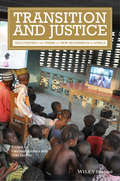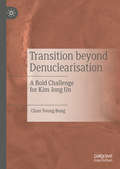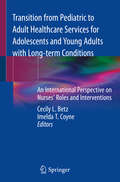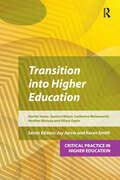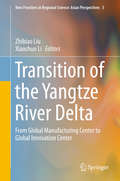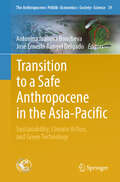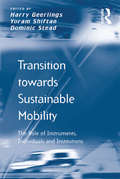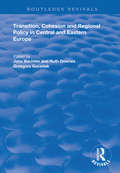- Table View
- List View
Transit Crime and Sexual Violence in Cities: International Evidence and Prevention
by Vania CeccatoHow cities are planned and designed has a major impact on individuals’ mobility and safety. If individuals feel unsafe in public transportation or on the way to it, they may avoid certain routes or particular times of the day. This is problematic, since research has also found that, in some cities, especially those in the Global South, a large percentage of women are "transit captives". Namely, they have relatively less access to non-public forms of transportation and are, therefore, especially reliant on public transport. This issue is important not only because it affects people’s safety but also because it influences the long-term sustainability of a city. In a sustainable city, safety guarantees the ability to move freely for everyone and provides a wider sense of place attachment. Transit Crime and Sexual Violence in Cities examines the evidence of victimization in transit environments in countries around the world, exploring individuals’ feelings of perceived safety or lack thereof and the necessary improvements that can make transit safer and, hence, cities more sustainable. The book’s contributions are grounded in theories at the crossroads of several disciplines such as environmental criminology, architecture and design, urban planning, geography, psychology, gender and LGBTQI studies, transportation, and law enforcement. International case studies include Los Angeles, Vancouver, Stockholm, London, Paris, São Paulo, Mexico City, Bogotá, Tokyo, Guangzho, Melbourne, and Lagos, among others.
Transit Life: How Commuting Is Transforming Our Cities (Urban and Industrial Environments)
by David BissellAn exploration of the ways that everyday life in the city is defined by commuting. We spend much of our lives in transit to and from work. Although we might dismiss our daily commute as a wearying slog, we rarely stop to think about the significance of these daily journeys. In Transit Life, David Bissell explores how everyday life in cities is increasingly defined by commuting. Examining the overlooked events and encounters of the commute, Bissell shows that the material experiences of our daily journeys are transforming life in our cities. The commute is a time where some of the most pressing tensions of contemporary life play out, striking at the heart of such issues as our work-life balance; our relationships with others; our sense of place; and our understanding of who we are. Drawing on in-depth fieldwork with commuters, journalists, transit advocates, policymakers, and others in Sydney, Australia, Transit Life takes a holistic perspective to change how we think about commuting. Rather than arguing that transport infrastructure investment alone can solve our commuting problems, Bissell explores the more subtle but powerful forms of social change that commuting creates. He examines the complex politics of urban mobility through multiple dimensions, including the competencies that commuters develop over time; commuting dispositions and the social life of the commute; the multiple temporalities of commuting; the experience of commuting spaces, from footpath to on-ramp, both physical and digital; the voices of commuting, from private rants to drive-time radio; and the interplay of materialities, ideas, advocates, and organizations in commuting infrastructures.
Transit Oriented Development in West African Cities (GeoJournal Library)
by Taibat Lawanson Basirat Oyalowo Timothy NubiThe book addresses conceptual issues around urban transportation policy and practice in selected west African cities. It highlights the institutional, socio economic and infrastructural barriers of transit-oriented development in West Africa. Through a series of case studies, the chapters present how transport governance systems affect housing, land, infrastructure development, urbanization dynamics, construction and the urban poor.The chapters in this book are written by authors from multi-disciplinary backgrounds including architecture, construction management, real estate, urban planning and public health, and are members of the African Research Network on Urbanization and Habitable Cities, a research network supported by the UKRI African Research Universities Alliance Capacity Building Programme. By providing a solid empirical portrait based on lived and research experience, this book will be a great resource to students, academics and policy makers in transport, urbanplanning and development policy as well as social scientists.
Transit Oriented Development: Making it Happen
by John L. RenneTransit Oriented Development: Making it Happen brings together the different stakeholders and disciplines that are involved in the conception and implementation of TOD to provide a comprehensive overview of the realization of this concept in Australia, North America, Asia and Europe. The book identifies the challenges facing TOD and through a series of key international case studies demonstrates ways to overcome and avoid them. The insights gleaned from these encompass policy and regulation, urban design solutions, issues for local governance, the need to work with community and the commercial realities of TOD.
Transit Street Design Guide
by National Association of City Transportation OfficialsThe Transit Street Design Guide is a well-illustrated, detailed introduction to designing streets for high-quality transit, from local buses to BRT, from streetcars to light rail. Drawing on the expertise of a peer network and case studies from across North America, the guide provides a much-needed link between transit planning, transportation engineering, and street design. The Transit Street Design Guide presents a new set of core principles, street typologies, and design strategies that shift the paradigm for streets, from merely accommodating service to actively prioritizing great transit.The Transit Street Design Guide is a vital resource for every transportation planner, transit operations planner, and city traffic engineer working on making streets that move more people more efficiently and affordably.
Transit Tourism: The Iconic Art and Design of 22 Subway Systems Around the World
by David SeltzerIn Transit Tourism: The Iconic Art and Design of 22 Subway Systems around the World, readers embark on a visual journey through the world's bustling subway systems, where each station tells a story of its city's soul. From the ornate elegance of Moscow's stations to the sleek minimalism of Tokyo's, this illustrated collection of travel essays explores 22 urban metros, revealing how their architecture, art, and design reflect the unique character and culture of each metropolis. Whether urban explorers, design aficionados, or simply curious about the hidden narratives beneath our cities, readers will encounter a fresh perspective on the subterranean worlds that shape our urban landscapes.Key Features:Visual culture showcase: Explore architecture, art installations, and graphic design.Unique book design: Each chapter mimics a subway line, with color-coded sections and Museo typeface inspired by timetable brochures.Entertaining narrative: Travel essays written from a tour guide&’s viewpoint for a passenger's perspective, blending humor and observation.Global scope: Covers major systems in North America, Europe, and Asia, appealing to travelers and urban enthusiasts alike.Subway system ratings: Each chapter concludes with a unique token ranking system, evaluating subway systems on convenience, design quality, and personality, providing readers with an assessment for planning their transit adventures. Uncover the fascinating stories beneath your feet with Transit Tourism: The Iconic Art and Design of 22 Subway Systems around the World, a captivating exploration of how subways shape and define the cities we love.
Transit-Oriented Displacement or Community Dividends?: Understanding the Effects of Smarter Growth on Communities (Urban and Industrial Environments)
by Karen Chapple Anastasia Loukaitou-SiderisAn examination of the neighborhood transformation, gentrification, and displacement that accompany more compact development around transit.Cities and regions throughout the world are encouraging smarter growth patterns and expanding their transit systems to accommodate this growth, reduce greenhouse gas emissions, and satisfy new demands for mobility and accessibility. Yet despite a burgeoning literature and various policy interventions in recent decades, we still understand little about what happens to neighborhoods and residents with the development of transit systems and the trend toward more compact cities. Research has failed to determine why some neighborhoods change both physically and socially while others do not, and how race and class shape change in the twenty-first-century context of growing inequality. Drawing on novel methodological approaches, this book sheds new light on the question of who benefits and who loses from more compact development around new transit stations. Building on data at multiple levels, it connects quantitative analysis on regional patterns with qualitative research through interviews, field observations, and photographic documentation in twelve different California neighborhoods. From the local to the regional to the global, Chapple and Loukaitou-Sideris examine the phenomena of neighborhood transformation, gentrification, and displacement not only through an empirical lens but also from theoretical and historical perspectives. Growing out of an in-depth research process that involved close collaboration with dozens of community groups, the book aims to respond to the needs of both advocates and policymakers for ideas that work in the trenches.
Transition 116: Nelson Rolihlahla Mandela 1918–2013 (Transition #116)
by IU Press JournalsThe 116th issue features essays, as well as some fiction and poetry, dedicated to the remembrance of former South African president Nelson Mandela.Published three times per year by Indiana University Press for the Hutchins Center at Harvard University, Transition is a unique forum for the freshest, most compelling ideas from and about the black world. Since its founding in Uganda in 1961, the magazine has kept apace of the rapid transformation of the African Diaspora and has remained a leading forum of intellectual debate. Transition is edited by Alejandro de la Fuente.December 2014 marked a year since the passing of Nelson Mandela—a man who was as much myth as flesh and blood. Transition pays tribute to Mandela’s worldly attainments and to his otherworldly sainthood. Featuring remembrances from Wole Soyinka, Xolela Mangcu, Pierre de Vos, and Adam Habib, this issue assembles Mandela’s staunchest allies—for whom he approached saintliness—as well as his most entrenched critics. Other contributors consider the iconicity of Mandela—including his representations in films; the importance of boxing to his political career; his time studying with the revolutionary army in Algeria; his stance on children’s rights; and even his ill-fated trip to Miami. Whoever you think Mandela was—or wasn’t—this issue is the new required reading.
Transition Engineering: Building a Sustainable Future
by Susan KrumdieckEngineering Transition: Building a Sustainable Future examines new strategies emerging in response to the mega-issues of global climate change, decline in world oil supply, scarcity of key industrial minerals, and local environmental constraints. These issues pose challenges for organizations, businesses, and communities, and engineers will need to begin developing ideas and projects to implement the transition of engineered systems. This work presents a methodology for shifting away from unsustainable activities. Teaching the Transition Engineering approach and methodology is the focus of the text, and the concept is presented in a way that engineers can begin applying it in their work.
Transition Redesigned: A Practical Philosophy Perspective (Praxiology Ser.)
by Boleslaw Rok Wojciech W. GasparskiTransition Redesigned deals with the philosophical bases of different types of transition: change in the economy, organizational/institutional change, and change in social and individual relationships. The editors' primary goal is to give further impetus to a much-needed worldwide debate on the issue of transition towards a better future.The volume reviews transitions made in different areas of human activity, assesses their relevancy, and analyzes their contexts. During this century, different organizations and institutions will undergo a level of radical and global change that has rarely been seen. The expected shift must be addressed in terms of a multidimensional transition toward building a sustainable society.Do we have an understanding of transition relevant to the task of meeting at least some of the challenges presented in this volume? Do we need a radical innovation for redesigning the transition that may enforce real social and ethical responsibilities into organizational practice on different levels and bring to life new ideas? Transition Redesigned seeks to answer these questions.
Transition Scenarios: China and the United States in the Twenty-First Century
by William R. Thompson David P. RapkinChina's rising status in the global economy alongside recent economic stagnation in Europe and the United States has led to considerable speculation that we are in the early stages of a transition in power relations. Commentators have tended to treat this transitional period as a novelty, but history is in fact replete with such systemic transitions--sometimes with perilous results. Can we predict the future by using the past? And, if so, what might history teach us? With Transition Scenarios, David P. Rapkin and William R. Thompson identify some predictors for power transitions and take readers through possible scenarios for future relations between China and the United States. Each scenario is embedded within a particular theoretical framework, inviting readers to consider the assumptions underlying it. Despite recent interest in the topic, the probability and timing of a power transition--and the processes that might bring it about--remain woefully unclear. Rapkin and Thompson's use of the theoretical tools of international relations to crucial transitions in history helps clarify the current situation and also sheds light on possible future scenarios.
Transition To Democracy In Latin America: The Role Of The Judiciary
by Irwin P StotzkyThe transition to democracy in Latin America encompasses adjustments in norms and institutions regarding the strictures of the rule of law. This book addresses the critical role of the judiciary in the transition. The contributors examine the significance of the independence of the judiciary, which ensures institutional integrity and freedom from p
Transition and Development in India
by Stephen Cullenberg Anjan ChakrabartiAccording to Nehru, the transition from a backward agricultural society to a modern industrialized society was the only road for India to progress. So, for the past few decades, India has focused its transitional development around movement away from a state-controlled economy toward that of a free market economy. Transition and Development in India challenges the current basis of this theory of development, laying the groundwork for an entirely new Marxist approach to transition that should apply not just to India, but to all developing nations.
Transition and Justice: Negotiating the Terms of New Beginnings in Africa (Development and Change Special Issues)
by Olaf Zenker Gerhard AndersTransition and Justice examines a series of cases from across the African continent where peaceful ‘new beginnings’ were declared after periods of violence and where transitional justice institutions helped define justice and the new socio-political order. Offers a new perspective on transition and justice in Africa transcending the institutional limits of transitional justice Covers a wide range of situations, and presents a broad range of sites where past injustices are addressed Examines cases where peaceful ‘new beginnings’ have been declared after periods of violence Addresses fundamental questions about transitions and justice in societies characterized by a high degree of external involvement and internal fragmentation
Transition beyond Denuclearisation: A Bold Challenge for Kim Jong Un
by Chan Young BangThis book seeks to go beyond conventional literature on the North Korean nuclear issue by examining the chances of survival of the Kim Jong Un regime, both with and without the nuclear weapons program. It offers a detailed historical background of the dysfunctional North Korean economy, explores the contemporary socioeconomic condition of the country, examines the failures of the Six-party Talks and other attempts at negotiations with North Korea, and outlines a blueprint for the survival of the regime through rapid economic modernization to be put forward by the five stakeholder nations in exchange for dismantlement of the nuclear weapons program.
Transition from Illegal Regimes under International Law
by Yaël RonenYaël Ronen analyses the international legal ramifications of illegal territorial regimes, namely the illegal annexation of territory or illegal declarations of independence, by reference to the stage of transition from an illegal territorial regime to a lawful one. Six case studies (Namibia, Zimbabwe, the Baltic States, the South African Bantustans, East Timor and northern Cyprus) are used to explore the tension between the invalidity of the illegal regime's acts and their effectiveness, with respect to the international relations of such territories, their domestic legal systems, the status of settlers and land transfers. Relying heavily on primary and previously unconsidered sources, she focuses on the international legal constraints on the post-transition regime's policy, particularly in the context of international human rights law.
Transition from Pediatric to Adult Healthcare Services for Adolescents and Young Adults with Long-term Conditions: An International Perspective on Nurses' Roles and Interventions
by Cecily L. Betz Imelda T. CoyneThis book offers essential information on interventions and actions that enable and promote transition experiences for adolescents and young adults. It provides guidance on appropriate strategies that bring together these groups and caregivers in the context of transition preparation, and those which optimize adolescents’ and young adults’ ability to self-manage their healthcare.The health care transition for adolescents and young adults has gained more attention given the improved survival rates, including for those with long-term conditions. It is now estimated that more than 90% of children diagnosed with a long-term condition will survive into adulthood. The significant change in survival requires concomitant services to facilitate adolescents’ and young adults’ successful transition to adult health care, therefore providers need education, knowledge and skills to support healthcare transition services. A recent US national survey demonstrated only 10% of parents/caregivers reported that their children received transition preparation services. This book is targeted at nurses and pediatric and adult health care providers of different disciplines seeking guidance on which interventions are available, how they can be used, advantages and challenges, and how best to promote a seamless transition for all adolescents and young adults with long-term conditions. It provides several examples of transition programmes and initiatives worldwide. There is an increasing focus on how nurses can support transition but little guidance on what is effective and what has been tried. This book will fill a gap by addressing all of these issues outlined above and by providing worked examples from leading nurse researchers and academics worldwide.
Transition into Higher Education (Critical Practice in Higher Education)
by Harriet Jones Hilary Orpin Gemma Mansi Catherine Molesworth Heather MonseyThis book will help all academic staff in higher education (HE) develop more informed teaching and better support students as they transition to university.It explores the organisations who advise students pre-university and uncovers the myths and misconceptions held by HE stakeholders. Induction and welcome activities are examined in order to identify best practice, transition problems such as study skills, employment, mental health and identity are covered, and a final chapter focuses on the effects of Covid-19 on transition issues.The Critical Practice in Higher Education series provides a scholarly and practical entry point for academics into key areas of higher education practice. Each book in the series explores an individual topic in depth, providing an overview in relation to current thinking and practice, informed by recent research. The series will be of interest to those engaged in the study of higher education, those involved in leading learning and teaching or working in academic development, and individuals seeking to explore particular topics of professional interest. Through critical engagement, this series aims to promote an expanded notion of being an academic – connecting research, teaching, scholarship, community engagement and leadership – while developing confidence and authority.
Transition of the Yangtze River Delta
by Zhibiao Liu Xiaochun LiThis is the first English book that presents a professional analysis of the recent dynamic movement of the Chinese economy by focusing on the Yangtze River Delta region, which is the main engine of the Chinese economy. The impact of the international financial crisis on China's economic development requires a change from the first wave of economic globalization oriented toward exports to the second wave of economic globalization characterized by expanding domestic demand. Taking this economic aspect into consideration, the following are proposed in this book: 1) expansion of the level of openness in the process of increasing domestic demand means shifting the industrial focus from manufacturing to the service industry; 2) promotion of the globalization of local services should be based on the globalization of local manufacturing; 3) the Yangtze River Delta region should aim at its own strategic positioning under new, changed circumstances and should achieve modernization in advance with the concept of integrative development; 4) Establishment of a support system is essential meanwhile for this area to develop an innovative economy and to promote the transition from manufacturing to promoting emerging industries, including a modern service industry. The book has an underlying concept, namely, that the key to economic transformation is to start the development of modern services and that only by transforming the development pattern of the service industry can the transition and upgrade of the economy be effectively achieved. For this purpose further urbanization and advancing the transformation from low-tech to high-tech industries by the effective development of industrial clusters is advocated. To ensure that these conclusions are based on a solid analysis, the authors draw heavily upon empirical analyses employing modern econometric methods and make use of economic theories such as endogenous growth theory and spatial economic theory.
Transition to a Safe Anthropocene in the Asia-Pacific: Sustainability, Climate Action, and Green Technology (The Anthropocene: Politik—Economics—Society—Science #39)
by José Ernesto Rangel Delgado Antonina Ivanova BonchevaThe Anthropocene concept highlights that we are now living in a new epoch of earth history where both the rapid accumulation of greenhouse gases and excessive consumption of natural resources endanger human and planetary wellbeing. Climate change is one of the main drivers of the Anthropocene and is intricately linked to many great challenges we face: lack of fresh water, food security, biodiversity loss, and human rights of present and future generations. The radical influence of humanity on nature must change from destructive to reconstructive, by the path of sustainable development, circular economy, climate action, green technology, and environmental awareness. This book explores the pathways of transition towards a safe and sustainable Anthropocene in the Asia-Pacific and reviews the progress and the challenges in climate action, the recovery from COVID-19, and the re-articulation of world order. The chapters address both regional and country levels, the majority analysing China and Mexico. The experiences presented can be replicated in other regions of the world. The book offers useful insights for all interested in the Anthropocene, in climate action, sustainability, and the relationship between human beings and nature, thus motivating the decision-makers to implement a just and inclusive transition to a safe Anthropocene. • A novel study that explores links between the Anthropocene, climate change, and sustainability, framing the transition towards a safe and sustainable Anthropocene in the Asia-Pacific. • Strategies and policies on climate action, renewable energies, green technology, and environmental education include the participation of governments, NGOs, and civil society. • Case studies based on experiences at the regional and country level provide valuable insights for both industrialised and developing countries.
Transition towards Sustainable Mobility: The Role of Instruments, Individuals and Institutions (Transport And Mobility Ser.)
by Yoram ShiftanReflecting the dynamic relationships between socio-technical behaviour and change, this book presents leading research on the transition process needed to achieve more sustainable transport systems. Focusing on making transition happen, this volume looks at various aspects and factors that are involved in the transition process and their implications for transport policy-making. The concept of Transition Management and how it can be applied to the transport sector is considered in detail, and forms the focus of the first part of the volume. The rest of the book is organised according to the three themes of transport energy use and emissions, the role of information in policy-making, and the evaluation of transport policy. This volume brings together scholars involved in research from various disciplines and countries to discuss the relationships between policy instruments, individual behaviour, institutional practices and the transition towards more sustainable transport systems.
Transition, Cohesion and Regional Policy in Central and Eastern Europe (Routledge Revivals)
by Ruth DownesThis title was first published in 2000. One of the most comprehensive overviews of regional development and policy emergence in the Central and East European countries to date, this book focuses on economic and social cohesion, bringing together a wide range of empirical research and discussion material.
